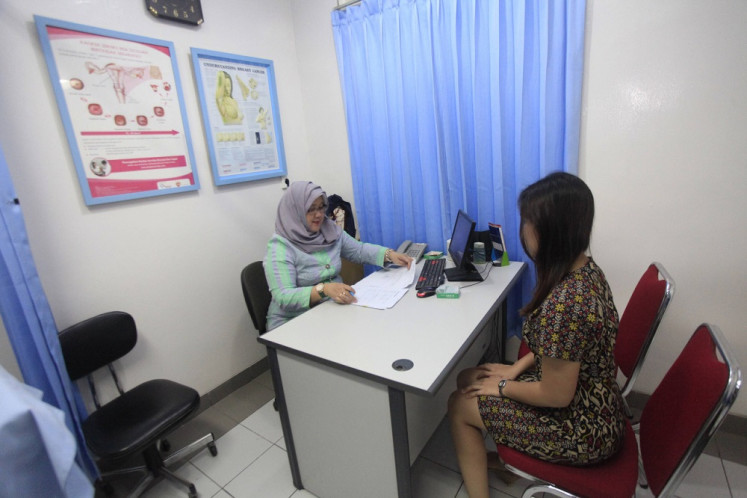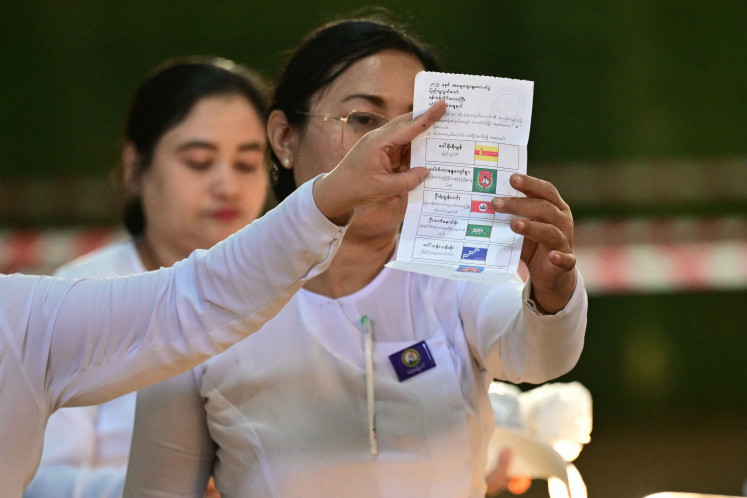Popular Reads
Top Results
Can't find what you're looking for?
View all search resultsPopular Reads
Top Results
Can't find what you're looking for?
View all search resultsGuaranteeing the safety of vaccine information
Public access to accurate and reliable information is vital in guaranteeing our future economic stability and health security.
Change text size
Gift Premium Articles
to Anyone
A
s the COVID-19 pandemic has demonstrated, good public health policy requires earning and maintaining people’s trust. The countries that responded most successfully to the pandemic have promoted scientific evidence and communicated new developments clearly and regularly to their citizens.
Yet in a time of rising misinformation and a fragmented information landscape, this is no easy task. Building trust in health information has happened unevenly, depending on where you live.
Now that vaccines have emerged as our passport to slowly transition out of the pandemic, political leaders are urgently working to promote vaccinations and achieve herd immunity. That has its challenges.
Vaccine hesitancy was already a problem before the vaccine rollout began late last year and continues to be extremely troubling in many countries like France where only 40 percent of French people say they intend on getting vaccinated - and the United States, where the latest surveys indicate that a quarter of the population say they will decline vaccination.
As more vaccine candidates seek approval from regulators and the public, a well-connected antivaxxer movement protected by closed social media groups and online echo chambers is deliberately muddying the waters to sow doubt on the safety of vaccines in the minds of people.
The world is in delicate shape and the stakes are high. If we are to safely exit this pandemic, we must vaccinate at least 70 percent of people everywhere. No one is safe until everyone is.
Therefore, public access to accurate and reliable information is vital in guaranteeing our future economic stability and health security, which as we have seen throughout this pandemic, is everything.
But with so much disinformation, how do we ensure that people everywhere have the same opportunity to read and hear fact, not fiction?
Governments, public health institutions and companies must collaborate to make health information freely accessible to as many people as possible. Collaborations of the kind announced late last year by the World Health Organization (WHO) and the Wikimedia Foundation, the non-profit that administers Wikipedia, are a start. The partnership will make trusted, public health information available under the Creative Commons Attribution-ShareAlike, enabling other organizations, individuals, and websites to more easily share these materials on their own platforms without having to address more rigid copyright restrictions.
Through the collaboration, people everywhere will be able to access and share WHO infographics, videos, and other public health assets on Wikimedia Commons, a digital library of free images and other multimedia.
With these new freely licensed resources, Wikipedia’s more than 250,000 volunteer editors can also build on and expand the site’s COVID-19 coverage, which currently offers more than 6,950 coronavirus-related articles in 188 languages. This WHO content will also be translated across national and regional languages through Wikipedia’s vast network of global volunteers.
Medical and scientific experts can also do their part to expand the availability of quality information about public health.
I founded The Vaccine Safety Project last summer to find and bridge the knowledge gaps related to vaccine safety on English Wikipedia. It is designed like a portal for Wikipedians with similar interests to collaborate with each other, with spaces for general discussion (talk), sharing vaccine-related news, listing articles related to vaccine safety, sharing tips for new editors and listing sources and missing topics related to vaccine safety. The project uses information from Wikidata, a free structured data repository that is updated every 24 hours to reflect the latest articles on vaccines that appear in journals.
This is one of several such initiatives on Wikipedia. Wikipedia editors, many of whom are from the medical community, have been on the frontlines of preventing the spread of misinformation surrounding the COVID-19 pandemic, by creating, updating, and translating Wikipedia articles with information from reliable sources. As one of the top 10 sites in the world, studies have shown that Wikipedia is one of the most frequently viewed sources for health information.
Wikipedia is doing its part but we need to see similar initiatives from government and scientific institutions. The infodemic surrounding the COVID-19 pandemic is as potentially life-threatening as the virus itself. Unless we can guarantee equity of access to information, the global vaccine equity that we all hope will transition us out of the pandemic will remain elusive.
***
The writer is a medical doctor, volunteer editor with Wikipedia since 2010, and the founder of the Vaccine Safety Project and has written, updated, and translated dozens of Wikipedia articles during the pandemic to ensure reliable information about COVID-19 is available for everyone.










